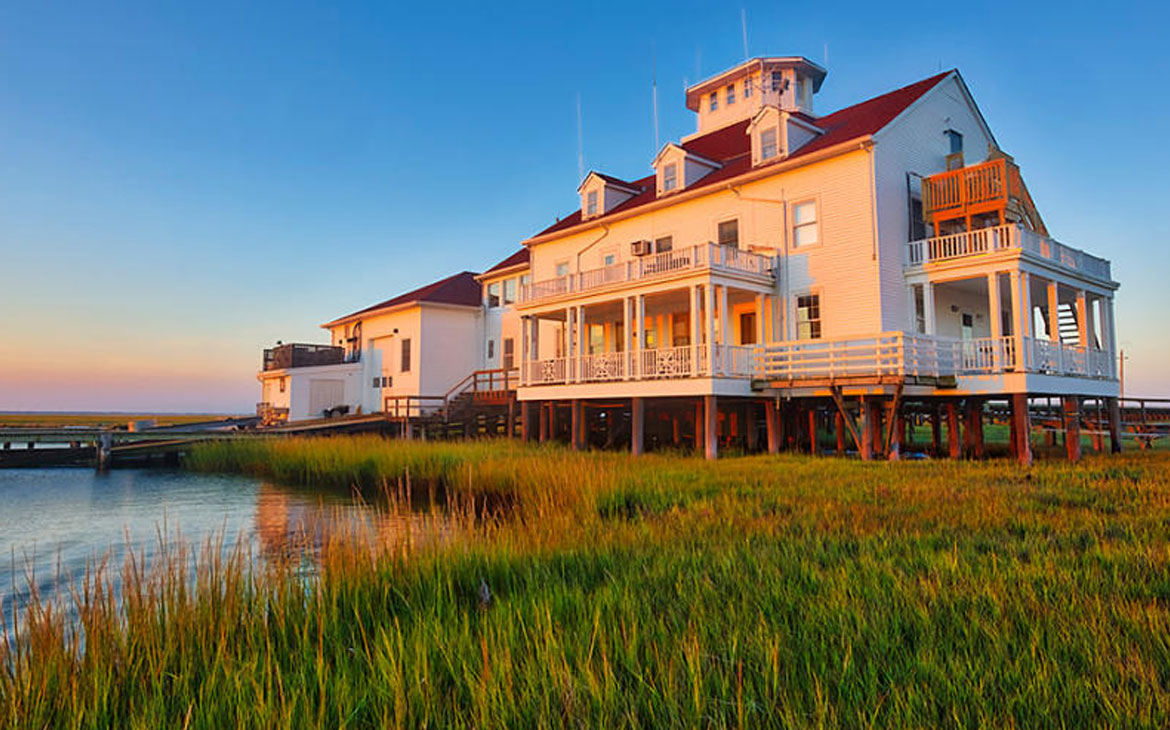Along the southern coast of New Jersey, stationed at the Rutgers University Marine Field Station, Kentucky-native Ben Sollee spent a week perched on the Great Bay’s edge, where the Mullica River empties.
As a selected partner with Sustain Music and Nature, the Americana artist and cellist commissioned a ‘songscape’ inspired by Edwin B. Forsythe National Wildlife Refuge. Here, by the wooded marshes, Sollee experienced one of the most pristine estuaries in the entire northeast, as well as the impacts of climate change.
The rural Kentuckian struck a fascination with the moment between the push of the tide coming in and the pull of the tide going out, where the water goes “slack.” Sollee recalls the water “becomes still, gets a little glassy.” In that passing juncture, Sollee found solace. His new single, “Slackwater,” pays homage to the placidity.
“There was something immediately captivating about the idea of this time of transition being a moment of stillness,” says Sollee.
Lyrically, the artist develops the ‘slack water’ as a character in the narrative. The song is a conversation with this natural phenomenon, discussing human nature and his troubles looking ahead with someone Sollee knows understands.
“And oh slack water, can you tell me why? / People don’t change until the water gets high,” he sings mournfully. He continues in a further verse, “And there’s trouble ahead the numbers don’t lie / and it’s scary as hell to look the truth in the eyes.”
The partnership with Sustain Music and Nature aims to engage musicians with American landscapes and the organizations that steward them. Their goal is to create new advocates for public land conservation, which has been significantly threatened by the current administration. The idea is to wield the cultural influence musicians behold and the emotional hook of the music itself to establish a position more compelling than data.
With the help of Emmy-award winning videographer Mallory Cunningham, Sollee brought the natural narrative to life. Drone footage captures the mouth of the Mullica River in all of its majesties. Native birds swim along with their canoes, swooping down to fish between the yellowing reeds thriving in the briney water, while Red Knots dance above.
With conscientious intention, the video exhibits very minimal human interaction. The scenes close with shots of Sollee and his son, fishing and exploring the sandy shore. Sollee feels the songscape is between a “message in a bottle” to his son and the future world he will live in and a prayer to the water facing an encroaching threat.
“One of the things that struck me over and over again during our visit is how dynamic this area is – the freshwater meeting the saltwater, the animals living in transition, and the birds migrating through. The ever-changing coastline and the waterways that are recutting themselves. It’s a place that invites change, that welcomes diversity,” Sollee explains.
“It’s a place in-between. And at this point in my life, both as an artist and a father – it calls me to reflect on my personal relationships. Especially my relationship with my son, who at the age of 10 is sort of in a transition himself – from the child he’s been to the young man he’s going to become.”
Hailing from a landlocked state, Sollee found the experience invaluable. He is a longstanding advocate for the natural world, and his dignified approach to the songwriting craft transforms the threat to the marine estuaries more palpable than political.
“While we have a lot of data and science on the effects of climate change and some understanding of what that might mean for our future, I think it’s hard for people to wrap their hearts around the issues and to really build affection,” the artist explains. “I feel like that’s what the arts are quite good at because it enters the body through a different part of the nervous system. That’s where people begin to shift and care, and most importantly, take action around issues, preserving the environment and protecting our natural resources.”
Betsy Mortensen and Harrison Goodale, co-founders of the organization, hope that the Songscapes project will continue to expose the beauty of the land we behold as American citizens and the highly talented musicians who advocate for this access. Ultimately, their goal is to immerse the issues deeply in music to move the needle on public land funding.
“Slackwater” and the accompanying music video will help raise support for our vital public lands, which play an important role in protecting us from climate change. Support Friends of Forsythe National Wildlife Refuge, Sustain Music and Nature, and Ben Sollee, here.

